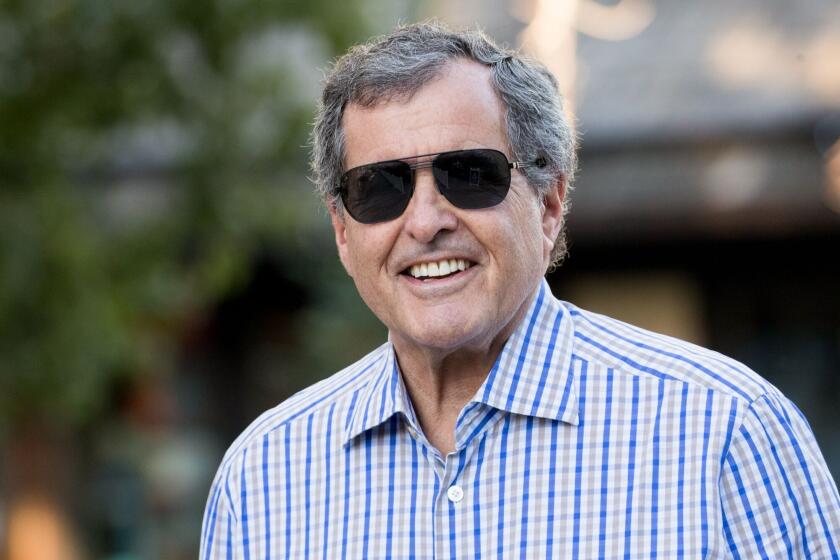Tobacco Lawyers Give Final Arguments in Death Suit
- Share via
NEWARK, N.J. — Tobacco company lawyers, completing eight hours of closing arguments Thursday in a closely watched cigarette liability trial, told federal court jurors that the companies did not fraudulently misrepresent the risks of smoking and are not responsible for the death of Rose Cipollone, a lung cancer victim whose husband is pressing her lawsuit against the manufacturers of the brands she smoked.
Cigarette makers “acted responsibly,” said Peter Bleakley, a lawyer for Philip Morris, which along with Liggett & Myers and Lorillard Inc. is a defendant in the trial.
The industry “had a legitimate basis for believing that it hadn’t been scientifically and medically proven” that smoking causes lung cancer, Bleakley said. “You may feel they were wrong,” Bleakley said. “That doesn’t mean they defrauded anybody.”
Portrayed as Bright
As the trial entered its fifth month, defense lawyers also portrayed Rose Cipollone, who lived in Little Ferry, N.J., and died at age 58, as a bright and well-read person who was constantly bombarded by anti-smoking articles in magazines and newspapers and whose husband, Antonio, the plaintiff in the suit, conducted what Bleakley called “a 37-year campaign to get her to stop smoking.”
In their closing statements, which began Wednesday afternoon and continued throughout Thursday, they argued also that the lung cancer Cipollone had was not even of a type statistically associated with smoking. Robert Northrip, a lawyer with Shook, Hardy & Bacon of Kansas City, Mo., who is representing Lorillard, said three pathologists diagnosed Cipollone’s tumor as an atypical carcinoid, whereas only one said she had small cell carcinoma, a smoking-related type.
Cipollone lawyers will make their closing arguments today and the six-member jury is expected to begin deliberation Monday.
No Case Lost by Firms
Tobacco companies have never lost or settled a cigarette liability suit since the first claims were brought against them in the 1950s. This case, filed in 1983, a year before Cipollone’s death, has attracted wide attention because it is the first in which the plaintiff’s lawyers have succeeded in obtaining thousands of internal documents from the cigarette companies, their consultants and industry organizations.
The plaintiff lawyers contend that the documents show early knowledge within the industry of the health risks of smoking.
All three companies are accused of fraudulently misrepresenting the risks of smoking and of conspiring to cast doubt on accurate information from scientific and medical groups to encourage their customers to keep smoking.
Liggett is also charged with failure to warn Cipollone and others of the risks of smoking and of breaching a warranty, expressed in its ads, that its products were safe. These claims apply to Liggett alone and only to its conduct before 1966, when a warning went on cigarette packages by order of Congress. The claims do not apply to Philip Morris or Lorillard because Cipollone did not smoke their brands until after 1966.
Prayer to St. Jude Cited
Defense lawyers reminded jurors that, according to a deposition Rose Cipollone made before she died, her mother always attributed her father’s fatal stroke to smoking. And, they said, Rose Cipollone was sufficiently concerned to pray to St. Jude to be spared from cancer.
“We have never claimed that quitting smoking is easy. It isn’t,” Northrip said. But millions of smokers have done it and the fact that Cipollone made no serious effort to quit, from the 1940s until her cancer was diagnosed in 1981, shows she made a personal choice to smoke, defense lawyers said.
“If you believe the testimony of Rose Cipollone and her family, that she smoked cigarettes because she wanted to and liked to . . . I believe you should return a verdict” for the companies, said Donald Cohn, a lawyer for Liggett, manufacturer of the Chesterfield brand. The plaintiffs contend that Cipollone, who started smoking in 1942 when she was 16 years old, was addicted to tobacco.
Tobacco lawyers also argued that, if the jury believes Cipollone’s death was smoking-related, actions by the companies still are not to blame.
Smoked After Warnings
“How can one conclude that more information prior to 1966 would have led Mrs. Cipollone to quit smoking, when she smoked for 15 years” after a warning went on cigarette packs? Bleakley asked. Defense lawyers also scoffed at the idea that Cipollone had relied on a warranty expressed in advertisements. “This woman is not the kind of woman who is going to be led around by the nose by advertising,” Cohn said.
Lawyers from all three companies lambasted the plaintiff’s top witness, Dr. Jeffrey Harris, a physician and economist who teaches at MIT and Harvard. Harris testified that medical studies and articles in the ‘30s and ‘40s should have alerted the industry to the likelihood that smoking caused cancer and obliged them to do research and issue warnings.
But Bleakley insisted that there was “not any credible scientific evidence that cigarette smoking causes lung cancer in the 1930s and ‘40s.” Many of the early studies were seriously flawed and contradicted by other work, Bleakley said.
Speak of ‘Claimed’ Hazards
Tobacco industry lawyers contend that there is no proof that smoking causes any human ailment and typically speak of the “claimed” hazards of smoking, or of the “risks attributed to smoking.” But numerous times Wednesday and Thursday lawyers dropped such qualifying phrases, as when Cohn said Cipollone was “well aware of the significant health risks of smoking.”
“I usually try and use one of those (qualifying) words,” Cohn said later, adding that he did not omit them “on purpose.”
“In four hours you may forget once,” he said.
More to Read
Inside the business of entertainment
The Wide Shot brings you news, analysis and insights on everything from streaming wars to production — and what it all means for the future.
You may occasionally receive promotional content from the Los Angeles Times.










